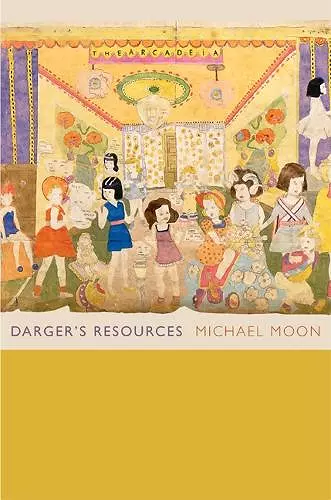Darger's Resources
Understanding the influences behind a unique artistic vision
Format:Paperback
Publisher:Duke University Press
Published:12th Mar '12
Currently unavailable, and unfortunately no date known when it will be back

This book provides an insightful exploration of Henry Darger, revealing the influences behind his imaginative yet unsettling artwork in Darger's Resources.
In Darger's Resources, Michael Moon delves into the life and work of Henry Darger, a self-taught artist whose unique creations remained largely unnoticed until after his passing. Darger, who worked as a hospital janitor, produced an astounding body of work, including a 15,145-page fictional epic titled In the Realms of the Unreal. His illustrations, characterized by a blend of beauty and violence, often portray idyllic landscapes marred by horrific events, particularly involving children. This juxtaposition raises questions about the nature of his art and the influences that shaped it.
Moon challenges the common perception of Darger as a mere eccentric or a product of mental illness, instead presenting him as a reflective artist deeply engaged with the cultural currents of his time. He draws attention to the various sources that inspired Darger’s imaginative universe, including popular culture, comics, and children's literature from the early twentieth century. By situating Darger within a broader artistic context, Moon highlights the connections between his work and that of contemporaries like H. P. Lovecraft and L. Frank Baum.
Ultimately, Darger's Resources offers a fresh perspective on a misunderstood figure in the art world. Moon's examination reveals the richness of Darger's artistic vision, demonstrating how his experiences and inspirations coalesced into a compelling, albeit complex, alternative reality that continues to resonate with audiences today.
"Darger's Resources is a masterful, witty, and moving contribution to Americanist scholarship. It is also an important book, one which will significantly alter the terms of Darger criticism in art history and expand the vocabulary of queer theory in an urgently needed way. Michael Moon links the practice of recuperating texts from punishing or pathologizing interpretations to a context based more on class and religion than on sexuality. In doing so, he provides a model of how to export some of the best innovations of queer studies to other cultural and historical terrain. Moon uses his recuperation of Darger to open up vistas of working-class cultural history."—Christopher Nealon, author of Foundlings: Lesbian and Gay Historical Emotion before Stonewall
"Darger's Resources is an important, lively, and moving book. As he did when writing about Joseph Cornell in his book A Small Boy and Others, Michael Moon takes a difficult figure, this time the rather Cornellish Darger, and refuses to demonize him or normalize him."—Carol Mavor, author of Reading Boyishly: Roland Barthes, J. M. Barrie, Jacques Henri Lartigue, Marcel Proust, and D. W. Winnicott
“In Darger's Resources, author Michael Moon (who also penned the tome Displacing Homophobia) puts Darger’s art in perspective, demonstrating how it was influenced and inspired by other creative works of the times, including comic strips, pulp fiction, and illustrated children's' books (especially Frank Baum's Wizard of Oz books) and freeing us up to appreciate Darger’s work without worrying about our own moral compass.” -- Diane Anderson-Minshall * The Advocate *
“Michael Moon... convincingly places the writer's vivid, imaginary worlds alongside those of other such fantasists as L. Frank Baum and H.P. Lovecraft. In the process, Moon upends conventional suspicions about lifelong loner Darger that critics, when considering the scenes of violence and at times oddly sexualized girls he depicts, have read into his art.” * Johns Hopkins Magazine *
“Moon is a pioneer in this revisionist study, first by revealing how the dark recesses of proletarian print culture can shed light on Darger’s gory and elegiac art (and vice versa), and second by his use of nuanced queer perspectives to further elucidate intersections between sexuality, class, and religion in Darger’s writings.” -- Leisa Rundquist * Journal of American Studies *
“This volume by Moon (Emory Univ.) is as singular as the art and narrative it explores. . . . Moon's slim monograph adds a recuperative and redemptive perspective to critical conversations swirling around Darger's oeuvre and its reception. . . . Recommended. Graduate students and researchers/faculty.” -- B. L. Herman * Choice *
“[A] fascinating study. . . . Through the extreme example of Darger, Moon shows us the ways in which Americans can seemingly piece together new personal narratives and create alternative textual realities through varied print cultures. . . .” -- Paige Gray * Journal of American Culture *
“Moon’s nuanced, insightful, and compassionate interpretations of gender expression are exemplary. . . . We can all admire Moon’s imperative to redeem Darger from the pathologizing interpretations of the past.” -- Miguel de Baca * CAA Reviews *
"Moon transcends the conventional reading of Henry Darger as outsider artist or sexual deviant to focus on the ways he borrowed from the polyglot landscape of US working-class culture—from comics and film to advertisements and newspaper articles. Moon argues that Darger provides us with the tools for thinking about working-class artists who produce without the tools and tutelage of elite arts institutions." -- Jennifer Glaser * American Literature *
ISBN: 9780822351566
Dimensions: unknown
Weight: 327g
168 pages